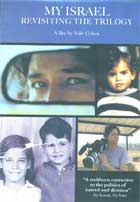
My Israel: Revisiting the Trilogy 2008
Distributed by Women Make Movies, 462 Broadway, New York, NY 10013; 212-925-0606
Produced by Yulie Cohen
Directed by Yulie Cohen
DVD, color and b&w, 78 min., primarily in Hebrew with English subtitles
Sr. High - Adult
Human Rights, Middle Eastern Studies, History, Jewish Studies
Date Entered: 11/03/2009
Reviewed by Maureen Puffer-Rothenberg, Valdosta State University, Valdosta, GAThis 4-disc set includes Yulie Cohen’s three films documenting her struggle as an Israeli who believed in reconciliation between Israelis and Arabs, and her effort to bridge a rift between her secular Jewish family and her Orthodox Jewish brother; and a fourth film abridging and combining the earlier three into one.
A sixth-generation Israeli and daughter of Israeli army veterans, Cohen grew up among the children of political and military leaders and as a young woman proudly served as a captain in the Israeli air force. In 1978 Cohen was injured in a terrorist attack that left one of her friends dead; twenty-three years later she found her attacker in an English prison and advocated for his release. In her film My Terrorist (2000) Cohen documented those efforts, her concerns about the endless loop of Arab-Israeli violence and revenge, and her efforts to speak out for peace. In My Land Zion (2004) Cohen looked more closely at Israeli nationalism and the Arab-Israeli conflict, through the lens of her own family’s history, their deep feelings about Israel as a nation, and their lack of concern for Arabs displaced after World War II. ,em>My Brother (2007) follows Cohen’s attempt to re-establish contact with her younger brother, who became an “ultra-Orthodox” Jew as a young man and afterward rarely communicated with his family. My Israel combines footage from those three films with some new footage and slight variations in narration, telling the same stories in a much more condensed, but still very effective fashion.
Cohen explores the personal impact of Israeli politics and the rift between secular and religious Jews using voiceover narration, readings from letters, archival footage, family photos, home movies, television clips, and conversations with her parents, daughters, friends, historians, and other victims of terrorism. She asks uncomfortable questions, involving those around her in thorny conversations about the Palestinians, terrorism, and the Holocaust. She persists in writing unanswered letters to her orthodox brother, unable to accept his silence. Cohen’s internal pain is evident in her face as she probes for answers from her position as an Israeli, a mother, a sister, and a daughter; she is affecting in her emotional honesty and determination.
These films examine complex questions in a personal, conversational manner, and cover some historical aspects of the Arab-Israeli conflict that may be unfamiliar to students. They may have a slightly greater appeal to women, as Cohen often speaks as a mother wondering if raising her daughters in Israel was the right decision. My Terrorist, My Land Zion or My Israel are highly recommended for students investigating Israeli nationalism, ongoing conflicts in the Middle East, and responses to terrorism. My Brother is recommended as a part of the trilogy or for collections supporting Jewish studies.